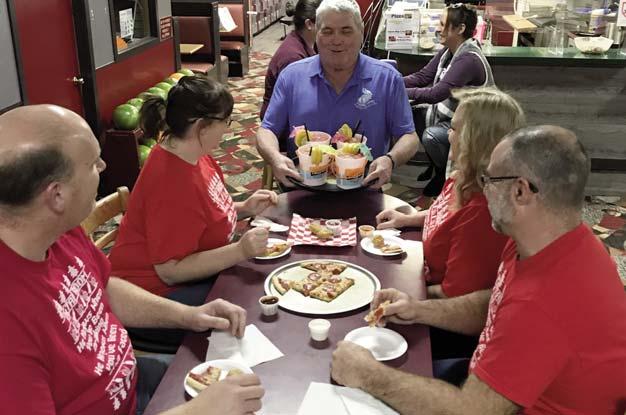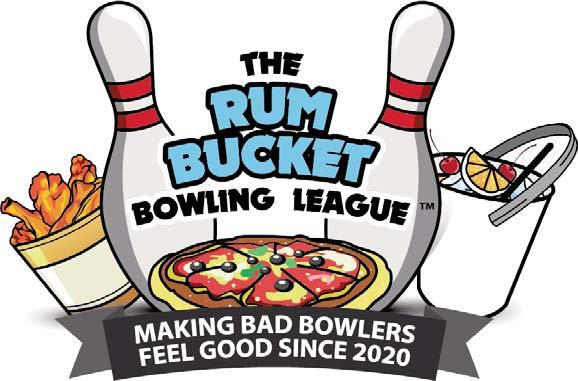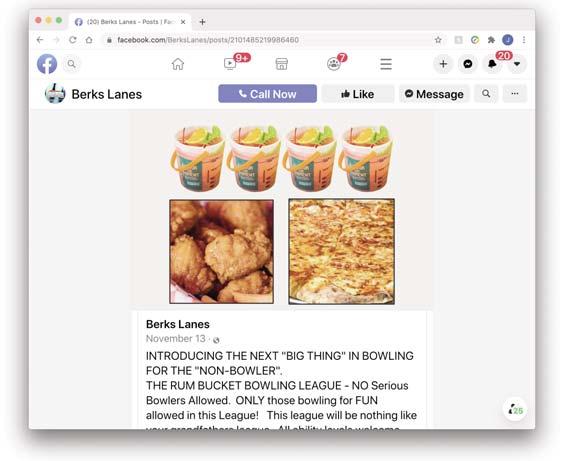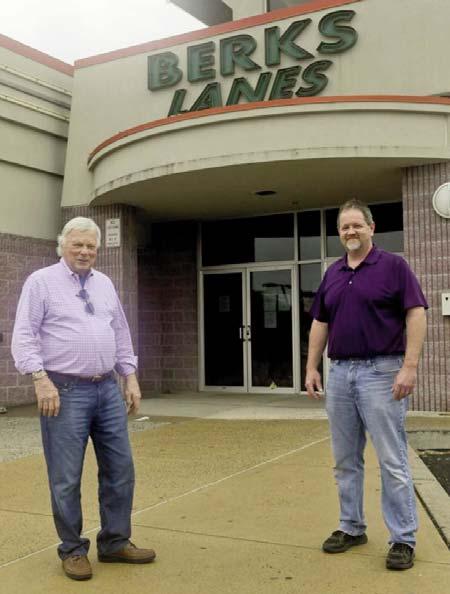
6 minute read
Marketing
By Evan Henerson

Looking for a means of bringing new bowlers into your center and keeping them happy and coming back for more? Consider the following recipe:

Don Carter Lanes Centers proprietor Brad Sommer (L) with Cherry Bowl and Forest Hills Lanes general manager Tony Hall.

In brief, the account you have just read outlines the steps taken by the pioneers of the Rum Bucket Bowling Leagues – a concept which industry experts think will be picked up by centers across the country. Dreamed up by industry veteran Brad Sommer and his general manager, Tony Hall, while sitting in a parking lot during a car show, Rum Bucket Bowling may prove to be a salve the industry needs as the nation emerges from the COVID-19 shutdown and long cooped up men and women carefully leave their homes in search of new and safe activities.
“The response has been crazy,” said Bruce Davis, president of BBBI/Kids Bowl Free and Davis Productions, Inc. “If you’re going to start a new league in the fall, even during good times, and you get 40 people to sign up, it’s a huge success. Brad got over 1,000 across his five centers. It’s just so unusual.”
“All told, after a week and half of promoting, we had 250 teams of four lines up,” added Sommer, general manager of the Rockford, Illinois-based Don Carter Lanes. “Normally you have to work your butt off just to get eight teams. It’s kind of like a pinch yourself type of moment. I’ve never seen anything take off like that.”
Back in late September and early October, Sommer put up a series of Facebook posts with a lot of graphics and emojis. The posts were promoted mostly to women ages 21 to 57 who lived within five miles of each center. As time slots filled up, they opened up new ones, to the point where a Rum Bucket League was scheduled for nearly every day of the week.
A winning idea is bound to be duplicated, and it wasn’t long before Rum Bucket Bowling moved east. After learning about the concept from Davis, Brad Bixler, general manager of Berks Lanes outside of Reading, PA, decided to investigate. After speaking to Sommer, Bixler had scheduled a meeting to discuss the idea with his staff. His IT person idly suggested posting a Rum Bucket league on Facebook with no extra fanfare such as boosts or paid advertising. Much like Sommer’s message, the Berks Lane post emphasized that if your goal was a spot in the PBA tournament, this wouldn’t be your bag. But if you were a bad bowler looking to have a good time, Berks Lanes Rum Bucket Bowling had the league for you.
And once again, the phones lit up with “bad” bowlers eager to join the action. That first post was in early November, and the league started within the month.
“Within four hours, I signed up 60 teams, just through a post on our Facebook page,” said Bixler. “We were going berserk from answering messages on Facebook, taking phone calls, and getting deposits from people because it took off so well.”
Bixler proceeded to share the idea with Hiester Lanes and Limerick Bowl, the two other Pennsylvania centers in his chain. Between the three centers, they started 200 teams of four. During the start-up phase, Bixler made sure that — in addition to getting a great deal — the customers received outstanding customer service. The Rum Bucket League bowlers were greeted upon their arrival and received instruction sheets explaining how league-style bowling worked. They also had dedicated servers who brought them their food and drinks and offered bowling tips as needed.
“You have to take care of these people. You have to be organized. Probably 95% of these people have never bowled before in a league atmosphere, so they don’t really understand what league bowling is, switching lanes and all that,” Bixler said. “We’re a bowling company and our objective is to develop league bowlers. So I had someone with them the entire experience. You’re not just throwing them on the lane and kind of forgetting about them. That’s very important.”

If, like this alcohol ignoramus of a writer, you wouldn’t know a Rum Bucket if it were ceremoniously emptied on top of your head, allow me to educate you. The concoction that gives the league its name is a rum mixture, with fruit and garnish, served up in a plastic 32-ounce bucket (one per bowler). The libation doesn’t have to be rum; a team could substitute the drink with beer, margaritas, or soda.
At the Illinois centers, Rum Bucket Bowling includes pizza, wings, and a t-shirt. Final cost: $16 per bowler, per week. Sommer even included a free bowling ball to any enlistees who were new league bowlers.
As Davis has noted, between all the offerings, you can “eat, drink, and be merry all in one place.” His company is in the process of developing a national marketing campaign rollout of Rum Bucket Bowling Leagues which in its tag line will boast, “Making bad

bowlers feel good since 2020.” For individuals who are willing to venture out during the pandemic, the league has the advantage of allowing a small number of people to get together in one place. Given the steps that proprietors have taken to keep their centers clean and safe, bowlers will reap the advantage of being able to keep the entertainment contained in one area.

An equally key ingredient to the success of the venture, according to Sommer and Bixler, is the fact that Rum Bucket Bowling targets men and women who are new to the sport or at least those who have never before bowled in a league.
“When asked why they signed up, the main reason they said was for the non-serious bowler,” said Sommer. “They would call up and say, ‘I want to sign up for the non-serious bowling league.’”
A few years ago, Sommer enjoyed success with the creation of a Women Bowling with Wine (WBWW) league, a Thursday night league which also targeted new, non-league bowlers and used alcohol as an enticement.
“I thought it was great that on a Thursday night I could get 24 teams of women, mostly new bowlers. I’ll take that every day of the week,” Sommer said. “But this just took it to another level. For whatever reason, the Rum Bucket Bowling League just had more appeal to a wider audience.”
Once these new bowlers are inside the center, and after they have enjoyed themselves bowling every other week with the eats, libation, and camaraderie with friends, Sommer views them as potentially transitioning to becoming full league bowlers. Others may keep reupping for Rum Bucket Leagues, which also means lanes get filled.
And, after the pandemic eases up and centers start to fill up again, Davis expects there will still be a place for bad bowlers, many of whom will have gotten hooked on the enjoyment of the sport.


Berks Lanes proprietor Al Blough (L) with general manager Brad Bixler
“Will this continue to be a viable product when we start to exit the pandemic? I think it will be,” said Davis. “It’s a matter of exposing younger-to-middleage adults. Word of mouth will follow this, and the people who are having a good time will tell their friends, ‘Let’s do it again.’ I think it will come out and perform equally well when you have 100% people to consider instead of 50%.” ❖

Evan Henerson
Evan Henerson is a features and lifestyle journalist who lives in Los Angeles. His work has appeared in TV Guide, American Theatre, Orange Coast and the Los Angeles Daily Newswhere he was a staff writer and critic for nine years.

